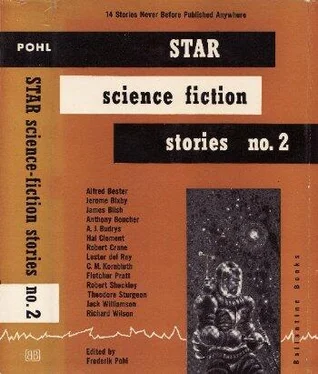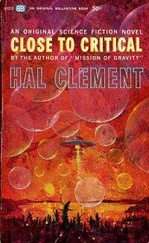Hal Clement - Critical Factor
Здесь есть возможность читать онлайн «Hal Clement - Critical Factor» весь текст электронной книги совершенно бесплатно (целиком полную версию без сокращений). В некоторых случаях можно слушать аудио, скачать через торрент в формате fb2 и присутствует краткое содержание. Год выпуска: 1953, Издательство: Ballantine Books, Жанр: Фантастика и фэнтези, на английском языке. Описание произведения, (предисловие) а так же отзывы посетителей доступны на портале библиотеки ЛибКат.
- Название:Critical Factor
- Автор:
- Издательство:Ballantine Books
- Жанр:
- Год:1953
- ISBN:нет данных
- Рейтинг книги:4 / 5. Голосов: 1
-
Избранное:Добавить в избранное
- Отзывы:
-
Ваша оценка:
- 80
- 1
- 2
- 3
- 4
- 5
Critical Factor: краткое содержание, описание и аннотация
Предлагаем к чтению аннотацию, описание, краткое содержание или предисловие (зависит от того, что написал сам автор книги «Critical Factor»). Если вы не нашли необходимую информацию о книге — напишите в комментариях, мы постараемся отыскать её.
Critical Factor — читать онлайн бесплатно полную книгу (весь текст) целиком
Ниже представлен текст книги, разбитый по страницам. Система сохранения места последней прочитанной страницы, позволяет с удобством читать онлайн бесплатно книгу «Critical Factor», без необходимости каждый раз заново искать на чём Вы остановились. Поставьте закладку, и сможете в любой момент перейти на страницу, на которой закончили чтение.
Интервал:
Закладка:
For a moment the explorer basked in the praise that was the deepest need of his kind; then he spoke again, with a delicious thrill of anticipation.
“Leaders, there is yet more, if I may speak.” Cracklings of surprise spread from the boulder-shot area, and the nearer citizens paused in their activities to learn what went on.
“Speak.”
“I was curious as to the nature of this solid which seemed as impenetrable as basalt, and strove to learn more about it. For a long time I made no progress; but at last I came to an earthquake zone, in which magma had risen very near the upper levels. About this point the strange substance was thinner; and while investigating the neighborhood, a pocket of magma broke through the Outer Void. This I could tell, partly because of the good seeing, and partly because I could feel the heat working down from the thin layers above.” He paused.
“This has occurred before,” commented one of the Leaders. “What did it teach you?”
“Where the magma spread, the solid disappeared—and became like the ocean!” Pentong stopped again, for purely rhetorical reasons—he knew there would be no interruption this time.
“As you all remember, Derrell the Thinker showed that ocean was a substance, apparently liquid like magma; he studied its sound-transmitting properties, and described them well. I heard his lecture, and examined the substance myself on several occasions. This crystalline sheath of the Southern Continent is simply solid ocean; it melted just as rock does when the magma reached it.” Again the pause, and this time the Leaders conferred briefly.
“Your point is of extreme scientific interest,” their spokesman finally said, “but we admit we do not see practical importance for it as yet. We gather from your manner that you do; if you would go on—” he left the sentence unfinished.
“My point is simple. Ocean protects rock from the oxygen, which filters down from the Void and kills those exposed to it—sometimes even renders rock poisonous. Much of our continent is protected by ocean, but much is not, and its upper layers are therefore unattainable. This solid ocean melts very easily, as I could see on the Southern Continent; and the continent seems to be covered with it to a depth of more than a mile, on the average. It may seem an ambitious project, but if that continent were to be heated enough to melt its ocean covering, would not it add to the ocean over the rest of the world and thus cover more of our continent?”
For long moments no answer came; Pentong could not tell whether the Leaders were actually considering the problem objectively or reacting emotionally to his admittedly audacious suggestion. The first response was in the form of a question.
“Just why should this material blanket the continents instead of remaining more or less where it is? You seem to be taking a good deal for granted.”
“I realize that the behavior of liquids such as magma and ocean out in the Void is not generally known,” responded Pentong. “However, there exists a good deal of observation which strongly suggests that magma, at least, tends to spread out over the surface of the Earth when released to the Void. I admit that further observation would be needed to prove that ocean does the same—but is it not already doing just that? It seems reasonable to suppose that the liquid ocean has spread as far as its quantity permits; if we add more, it should spread farther. Let us at least check this point; I can show the way, or for that matter describe it, to the Southern Continent, and the necessary experiments could be conducted by a small group.”
The news of the Pentong project took some time to reach Derrell the Thinker. There were several reasons for this; for one, he was located thousands of miles from the city under the Gulf of Mexico where Pentong had made his report, and for another he was in the midst of a battlefield. The latter fact was not at once evident; the only sights and sounds—the two were identical to Derrell, whose only long-range sense reacted to shock waves in the earth’s crust—were those emitted from the earthquake belt to the south and west. He himself was focusing his entire attention on a matter unconnected with the battle; but at least half of his research crew had their fluid bodies extended and joined into a single net that surrounded the entire area of the experiment. It was hoped that none of the savages from the Asian mainland would get through the net without touching one of its strands and betraying their presence.
The thing that interested Derrell was a cave, something almost unheard of in the depths where his people dwelt. Virtually all the empty spaces, which his people regarded asextensions of the Outer Void, were very close to that void; and they were almost without exception filled with the oxygen which poisoned the rocks for the dwellers of the depths. Occasional bubbles occurred in the igneous rocks, of course, filled with gases which had come from the rocks themselves; but as a rule these were unapproachable—the material in which they occurred was nearly impenetrable to the members of Derrell’s race, who traveled through rock rather as ink does through a blotter.
The present cave was one of the few exceptions to this rule. The rock itself was not porous enough for travel, but seismic strains had produced a network of miscroscopic cracks part way into the mass which permitted slow progress, if the traveler had persistence.
Derrell had seen caves before from a distance, but the thing he was watching now had never occurred within his memory or knowledge. The upper level of the bubble was just at the top of the igneous layer in which it had formed; the rock above was sedimentary. Between the two layers a thin sill was gradually making its way from a pool of magma a few miles distant—a pool that was being fed by energy from sources far below, and outside the bounds even of Derrell’s knowledge. It was more than likely that some day this sill might grow to the proportions of a laccolith, in view of the nature of the rock above; but this was not the scientist’s concern at the moment. The advancing magma was approaching the bubble, and he wanted to see what effect the trapped, high-pressure gas in the “empty” space would have on the molten rock. It was fortunate that this was occurring just here; the endless, tiny seismic shocks from the southwest made things clearly visible throughout the region. It would have been extremely dangerous, with the Asian savages filtering through the neighboring strata, if the investigators had had to produce sounds of their own in order to further their research.
Derrell had a mental picture of what would occur when the molten rock reached the bubble, but like any good scientist he was not allowing it to influence his observing technique. He intended to see everything that happened; and his attention was so completely centered on that particular volume of rock that the arrival of one of his assistants, who had been on a short leave to the nearest of the frontier cities, failed to distract him in the slightest. The assistant himself forbore to interrupt, though he had news that he knew would be of interest; for the magma was very close now to the bubble. Like the chief scientist, the newcomer had a mental picture of the hot fluids simply reaching the cavity, flowing around its walls, and gradually filling it from edge to center. Like Derrell, his idea of the general nature of gases was too sketchy to permit him to realize that, at the very least, the vapor in the bubble must dissolve in the inflowing rock before his picture could be carried through; and like his chief, he had no conception whatever of another force that would also operate. No living member of their race had ever had a good look at a fluid that was not in a confined space; they had never seen a free liquid surface. Their experience was about to be enlarged.
Читать дальшеИнтервал:
Закладка:
Похожие книги на «Critical Factor»
Представляем Вашему вниманию похожие книги на «Critical Factor» списком для выбора. Мы отобрали схожую по названию и смыслу литературу в надежде предоставить читателям больше вариантов отыскать новые, интересные, ещё непрочитанные произведения.
Обсуждение, отзывы о книге «Critical Factor» и просто собственные мнения читателей. Оставьте ваши комментарии, напишите, что Вы думаете о произведении, его смысле или главных героях. Укажите что конкретно понравилось, а что нет, и почему Вы так считаете.












